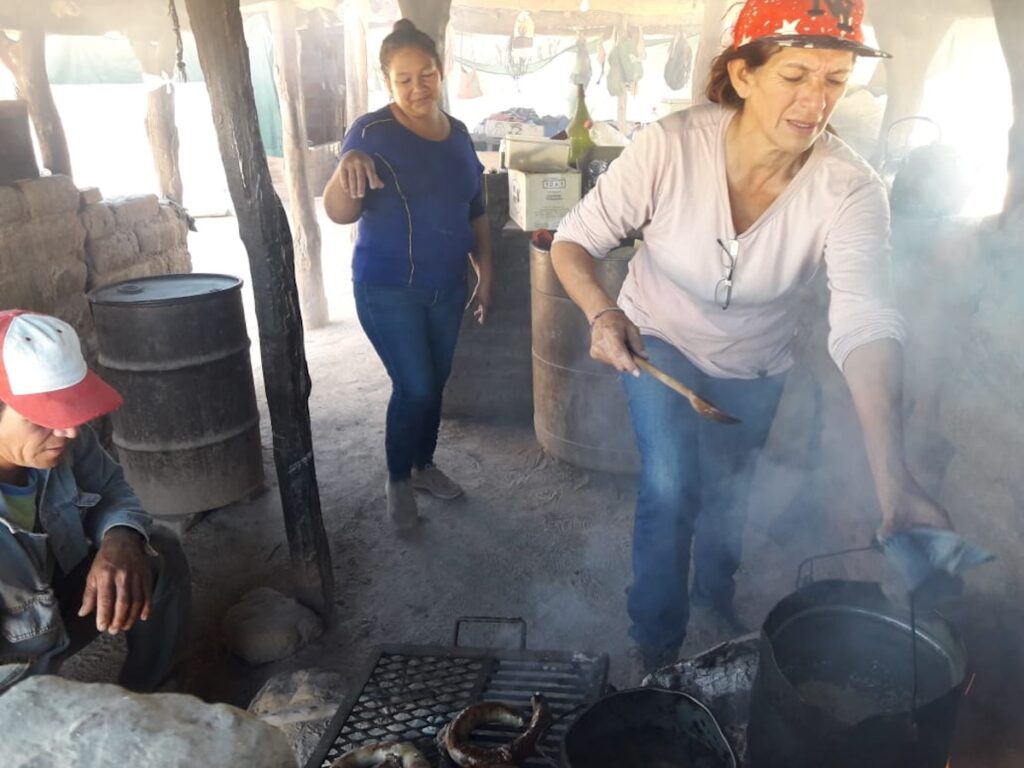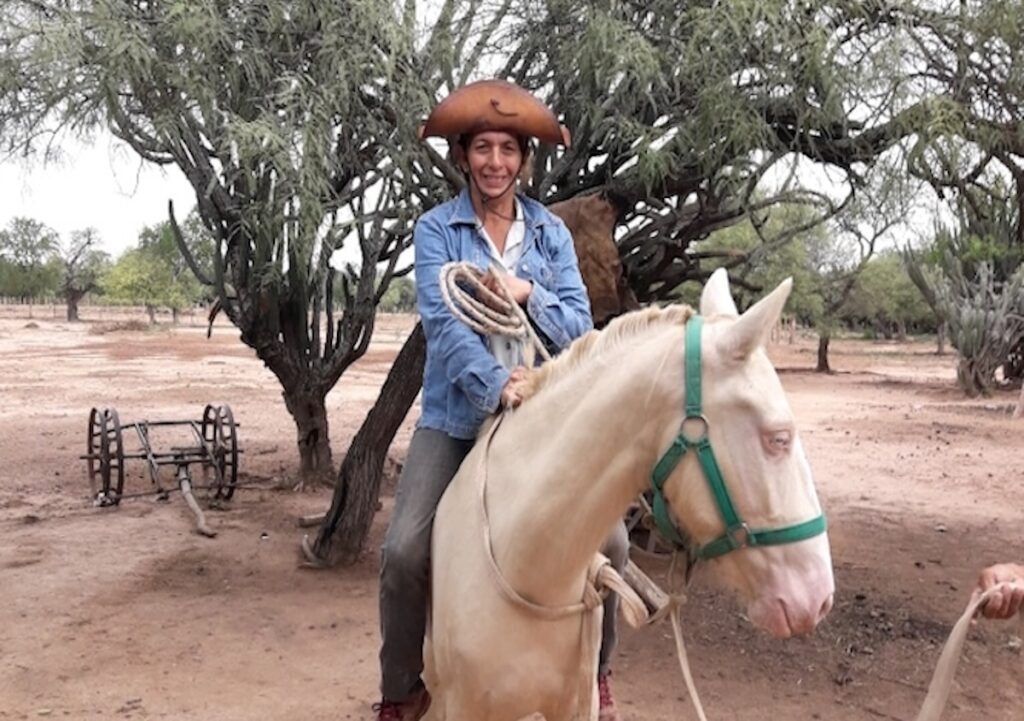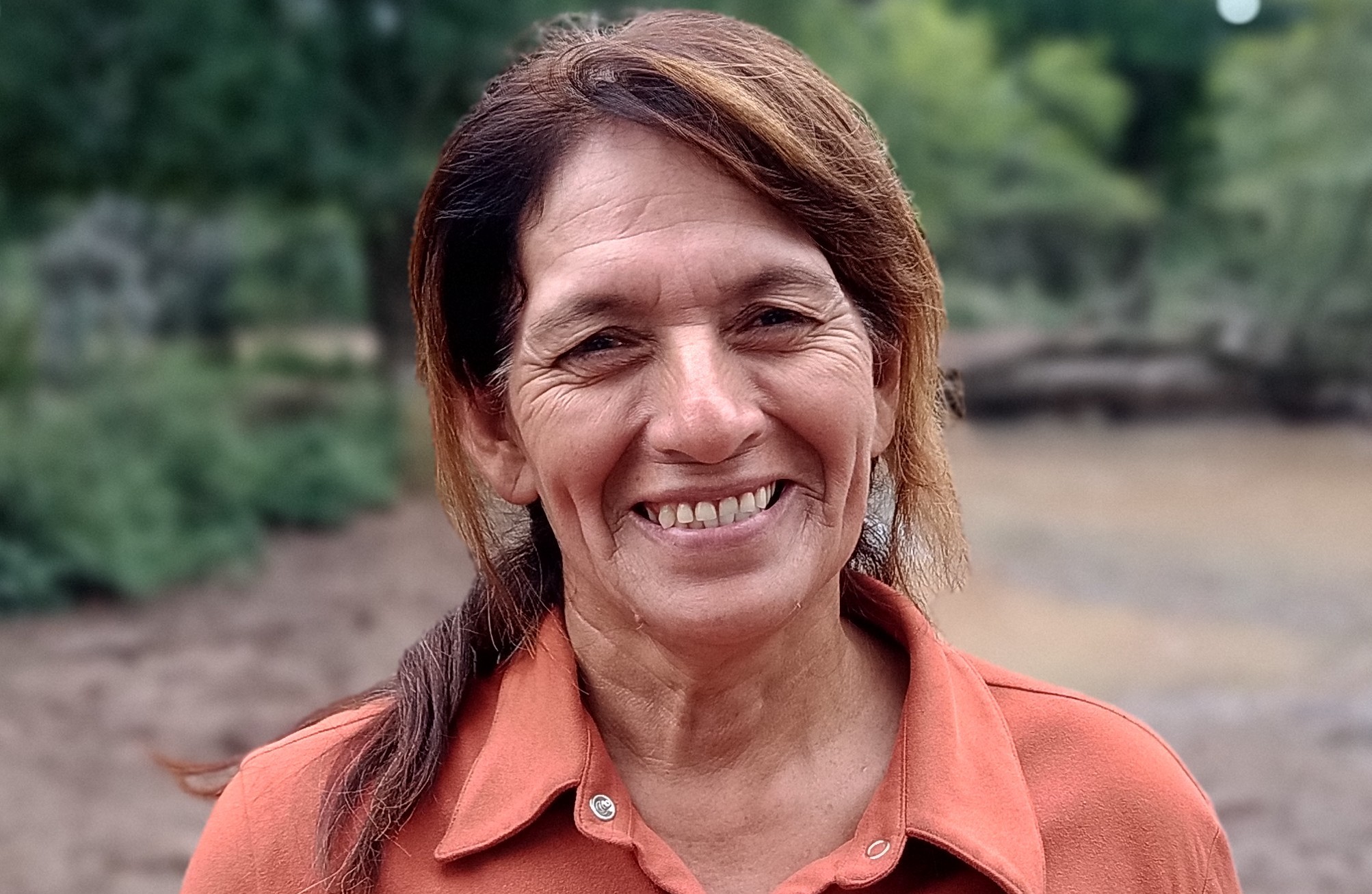“Primero que nada, soy campesina”
“First of all, I am a peasant.” This is how Lucía introduces herself. She was born in El Persigo, a small town in the Salta Province, in northern Argentina.
Lucía’s typical day is similar to that of many farmers in the region. Unless there is milking to be done, she wakes up at 6 a.m., feeds her chickens, and cleans, waters and tends to her cattle. After lunch, she and her brother go to the well to draw water, as there are no nearby streams or ponds.
The area is increasingly dealing with high temperatures. Last year, the thermometer topped 46°C, making it difficult to work for extended periods. If temperatures allow it, Lucía and her brother will spend the afternoon moving the fences in their grazing paddocks to bring their cattle to fresh feed.
Her daughters attend school and live El Persigo, but they return to the countryside on the weekends to bake their own bread for the week rather than buying it in town where it is more expensive. Though they are just an hour away by motorcycle, the roads are challenging, especially when the rains come.
Lucía owns 250 hectares, which may sound large, but is considered small by Argentine standards. Her main income-generating activity is cattle ranching. Lucia manages a herd of 25 cattle, between calves and cows. This includes her animals, and those of her brother, and a friend.
“It makes no difference tending to someone else’s animals,” she explains. There is a solidarity that permeates the community. Beyond cattle, she raises pigs and chickens for their own needs. When asked if she also does her own processing, she answers us with a laugh: “I would have to be Wonder Woman.”
Indeed. Apart from running her farm and household, Lucía has been president of Unión y Progreso, a civil association, for 12 years. And that’s not so typical.

As part of a multi-stakeholder collaborative process to implement the Forest Law protecting native forests in Argentina, Solidaridad convened the association with local producers in 2019. And that is how we came into contact with Lucía. The objective of the effort was to improve how members manage cattle grazing in ‘yellow areas’, so that they could became more profitable and sustainable.
Yellow areas are protected native forests with high conservation value. Although clearing the forest is forbidden, people can pursue economic activities within it. Silvopastoral, or integrated livestock farming, is one way families can earn a livelihood from the forest without destroying it. Animals are free to graze and search for food within the native forest as long as they are properly managed.
The Chaco forests, as seen from a drone, look like a green-gray carpet, but once the view dips below the treetops, very little grows on the dry ground. This is a harsh landscape, and that roughness shapes the people here, who must continually adapt to survive. These adaptations converge in Lucía’s story. The changing environment, a value chain designed for larger producers, and social structures that deprive women of opportunities have forced her to find creative ways to succeed.
When asked if there is any experience from her life she would keep from her daughters, she replies with a smile: “I have liked everything in my life. I always think that the mistakes that one makes in life are just part of learning.”
“At home, dad didn’t love his daughters very much, he preferred his sons,” she adds. “I’m allergic to mosquito bites, and when I cried because of the bites, my father would get angry or complain to my mother. He didn’t like to hear his children cry, especially if they were female. And then there is the fact that abuse was common in the region.
“I, as a young woman, had to live trying to avoid these things, and that goes hand in hand with sexism. Men would do what they wanted to women, to little girls. It was seen as men just being men. Today you don’t see it that much, but before you did. Mothers were unaware or they were outright neglectful. Being a young woman, a little girl, you had to take care of yourself, and it was ugly. Then you grew up and I, for example, never left my daughters alone with anyone.”

Lucía has four children, two girls and two boys. She teaches her sons to respect all women – especially their partners – as if they were their sisters. And she shows her daughters how to keep their wits about them and be self-sufficient on the farm.
Last year, Solidaridad conducted a gender assessment among members of the association. Lucía remembered an exercise in tallying how tasks at home and on the farm were divided among women and men.
“I believe that women can do the same tasks as men. There is no difference. Cleverness does it all. You don’t need that much strength; you need skills to figure out how to do things. For example, I use the lasso. And while I don’t have the strength to hold down a cow or a big calf, I let them run with the lasso until I find the nearest tree or post to tie them. I also handle the chainsaw. I cut posts, I load them, and I take them where I want. Now I don’t carry them on my shoulder, but I used to do that too. We might not have the same strength, but we have intelligence.”
When asked what she would like to do if she wasn’t a farmer, Lucía replies: “I’ve already done everything in life.” She started working at a young age in the city of Salta and earned a living as a professional hairdresser, baker, taxi driver, builder and farm worker.
“I would have liked to study veterinary medicine or law. I had law in high school and I loved it. I also liked accounting very much. In everything involving our association, you have to have a lot of knowledge of the law. When problems around land tenure began to occur, I learned from the lawyers so I could support the member’s litigation.”
Lucía believes that she was born with leadership qualities, but she didn’t realize it until she joined different groups and always ended up being the spokesperson or taking decisions. Twelve years ago, when her father died, she returned to El Persigo from Salta to take charge of the family farm. She found, in her words, a decrepit field, her family’s land wasted, and a community with many shortcomings.
Soon enough, she was invited to a talk by an organization where she began to learn how she could work with them to coordinate efforts to better the community. She then went to a meeting at the local school where she reunited with neighbors and relatives she hadn’t seen in many years. There Lucía and 12 of the attendees formed the first board of what was would become “Unión y Progreso”. After six months they obtained legal status.
Lucia doesn’t like to borrow. She knows about the loans from Banco Nación, but with little available capital, she is hesitant to put what she has at risk. In an average year she sells between three and four calves, but when she needs to buy corn she prefers to sell a few goats or a few pigs. With the ground corn she can feed her chickens, her cows, and her dogs (who are her close companions that take care of her in the forest).

One of the main challenges she and other community members struggle with is the way that veterinary services are designed for larger producers. With just a few animals, everything is more expensive.
For example, Lucía has three calves that need to be vaccinated, but the minimum amount of doses she can buy in the market is 50. With a short expiration date, she either needs to purchase them and let 47 doses go to waste or just not vaccinate, which is not a good option. She now has two pregnant cows and two others in heat, so she is trying to synchronize the animals so that they give birth around the same time.
She and her friends often look for ways to buy together in bulk, but delivery is a problem. Farms here are too far from each other, and delivery drivers don’t usually accept the order.
Lucía sees the work being done with Solidaridad as a lever for people to begin pulling themselves up. It is not all that they need, but it builds a foundation for those who have nothing.
To her mind, the most critical thing is to recover pastures, then gain access to water, and then animal health.
“These times have been very bad, we haven’t had enough rainfall for the soil to green up so that cows can feed in the forest.”
Lucía knows that if farmers allowed their herds to graze freely, they would eat all of the available pasture at once and the soil would lose its ability to regenerate. This is why Solidaridad is teaching association members to divide their pastures into paddocks and rotate their animals through grazing areas. They are building water wells, and providing veterinary assistance to detect the cause of low fertility in cows.
Among members of the multi-stakeholder roundtable that Solidaridad facilitates, there have been meetings to discuss how to integrate the association into some of the larger partners’ value chains.
“I like that we can get into an agreement with them,” says Lucía. One of the topics they are exploring is how to hire a tax advisor who can help find a feasible way for the association to invoice their sales and pay taxes. This would allow them to enter formal markets that pay better prices for their animals.
Cattle ranching in the northern provinces of Argentina is very different from the images of the Pampas, Argentina’s central plain of natural grasslands with plentiful rainfall and a temperate climate suitable for breeds, such as Shorthorn, Hereford and Aberdeen Angus.

In the Chaco, the animals that are best adapted to the high temperatures and forest are the Creoles. These cows are used to “browsing”, that is seeking out their own food in trees and bushes. They are different from purebred animals, who must have pasture provided for them. Creoles eat the fruit of the carob, the mistol, the guayacán, and the shoots of palo santo leaves to complement their diet. The presence of the forest is also important during the rainy season because the carob trees, the chañares and the palo santo consume a lot of water and help prevent flooding.
Lucía remembers better weather when she was a girl. There was no shortage of water and people grew corn, pumpkin, watermelon, and even prickly pear plants. The heat in the Chaco has always been strong, but consistent rains reduced its impact and the droughts were not as long. Along with the over extraction of groundwater, existing reserves can become briny.
“I am afraid of extracting underground water for irrigation and losing the land with that salty water. I saw a lot of terrain turned to desert due to irrigating with salty water.”
In 2019, Lucía participated in the COP in Madrid traveling with other women from Bolivia, Guatemala, and Honduras.
“We were all peasants. The difference is that we – in Argentina – manage more hectares than them, and they grow fruit or vegetables. If they have cows, there’s usually just one or two.”
Lucía perceives forest clearing as the greatest driver of climate change in her area. “Since my time in Spain, forests continue to be dismantled here, and all over the world. If there was a change, it has been for the worse. It doesn’t seem to me that there has been any progress,” she says.
She adds, “National leaders need to think about the future. Not just 50 or 100 years ahead, but the next month and tomorrow even. I don’t want to go on suffering from this situation. Burns and skin diseases are not accidents. And the wild animals that had inhabited the forests are coming closer to where we live. Even pumas have arrived here because they have nowhere to go.”
With the support of the Kering Foundation, Solidaridad will apply regenerative livestock practices on 120,000 hectares together with 250 family farmers over the next three years. They aim to conserve 75,000 hectares and restore 36,000 hectares of forest and native vegetation. To support this transition, Solidaridad will work with Unión y Progreso and the Coordinating Board of Organizations of Route 81 to:
- Increase the capacity of soils to sequester carbon, retain water and improve soil fertility.
- Protect, restore and enhance biodiversity, both on the farm and in the surrounding landscape. This includes avoiding any conversion or degradation of natural ecosystems.
- Eliminate the use of synthetic agrochemicals in favor of ecological solutions that promote natural processes.
- Improve the animal welfare of livestock.

